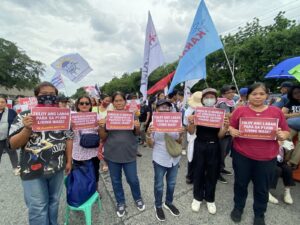By DIEGO MORRA
In sum, that is the farcical argument foisted by a gang that purports to be a think tank in viscerally opposing the proposed P200 legislated wage increase, along with columnists who think that the economic savior – foreign direct investment—would not touch the country with a ten-foot-pole because of its “astronomical” wage level.
As expected, the members of the House of Representatives and the Senate made a big show that they were bleeding hearts, and would consent to raise the pay during an election year, only to kill their contrasting proposals procedurally, with the Senate insisting that the Lower House adopt the chamber’s proposed P100 wage hike rather than pressure the Senate to approve a P200 pay raise that would be condemned to high heavens by plutocrats and the various chambers of profiteers, local, foreign and in-between.
Senators blamed the congressmen for submitting the wage increase proposal on June 4, 2025, claiming that the bicameral conference committee (BCC) should be assembled first to hash out the differences and this requires time that would intrude into the precious period when lawmakers are supposed to be industrious and consumed by the desire to craft world-class laws under the leadership of the best cheese in the world, certainly superior to Spain’s “Manchego” in tandem with “jamon iberico.” Yet, Chiz Escudero has lately been in life-and-death struggle with Webster’s Dictionary and Black’s Dictionary over the exact meaning of “forthwith,” the job description of an impeachment judge, the functions of the impeachment court, the meaning of “functus officio” without consulting Wittgenstein and many more.
As expected by Filipino workers, the two chambers succeeded in failure. They did not go together like a horse and carriage and they fought bitterly in the dying days of this forgettable Congress to achieve what they really wanted not to do—approve a legislated wage increase. It also mattered most that the sign from Malacanang was clear- dark smoke rose from some chimney—indicating that a pittance of a wage increase was disastrous to business. It was certainly not disastrous in 1989 when the late President Cory Aquino signed Republic Act No. 6727 that granted P89 in wage increase nationwide. The warnings issued by the servitors of capital in 1989 were the same pettifoggery disseminated this year, that entire industries would collapse due to “greedy workers,” foreign corporations would flee to parts unknown and workers would “suffer” the worst consequences of their “folly.” One stupid argument advanced by a debauched academic was that higher wages “stunt” productivity.
Yet, congressmen and senators are supposed to be better paid than these mercenaries, who are like jukeboxes that spin ditties at the drop of a coin, and they were elected precisely to craft laws that would promote, protect and enhance the economic conditions of workers and peasants. The actions of your favorite cheese and preacher’s son showed that these legislators are a tad worse than the emaciated workers they are sworn to protect. The wage increase proposal disappeared from official business, which means a deliberate move to scuttle the matter just when workers are protesting nationwide. The Senate was free to choose its agenda and ignore what its bicameral partner proposed. Is the Senate “semper altius”?
Of course, the country is progressing, according to the mantra of Marcos economic planners, even if their statistics clash with each other, their synchronic data good only for a week, and any quarterly upward movement of the economy becomes synonymous with success, just like stock market analysts who blame global conditions for the weak peso and the balance of payments deficit. One commentator gushed that the country is progressing on the basis of monthly surveys by Social Weather Stations (SWS) and Pulse Asia from January to April 2025. SWS said 50% of families rated themselves as poor during the April 23-28, 2025 survey. The self-rated poor was 55% in the April 11-15 survey, up from 52% in March, 51% in February and 50% in January.
Diligent, indeed, but wild swings in economic conditions do not obtain on a monthly basis. The SWS survey noted that self-rated poverty was highest in the Visayas at 67%, Mindanao at 61%, Balance Luzon at 43% and Metro Manila at 33%. So, where is progress there? The results of the midterm elections kicked the butt of SWS, Pulse Asia, OCTA Research and others for failing to predict the outcome, forcing these statistical diviners to come up with a universe of excuses to explain why they were apparently curb-stoning. On the matter of the economic status of most Metro Manila residents, it turns out that 43% live in shantytowns, with 63% of them earning below the minimum wage.
When locators in various export processing zones abandoned the country during the incumbency of the unlamented presidency of Gloria Macapagal Arroyo, the dispute was over tax perks, reduced customs duties, ample supply of water and power, as well as officials who saw those corporations as rice granaries. Intel, Texas Instruments, and others wanted their incentives extended or else they’ll pull up their stakes and ship their factories to Vietnam and other countries. They did not quibble about wages, which, at that time, were only 5% of the pay of American workers. The low-wage regime attracted transnationals; extortion kicked them out.




